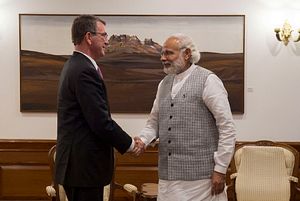Paul Ryan, the speaker of the U.S. House of Representatives, has invited Indian Prime Minister Narendra Modi to address a joint session of the U.S. Congress during his fourth visit to the United States, which is expected to take place later this year. Ryan’s invitation comes at a time when U.S.-India relations continue to go closer on all tracks, notably including increased economic and defense cooperation. Modi will become the fifth Indian prime minister to address the U.S. Congress.
In a press statement, Ryan’s office noted:
The friendship between the United States and India is a pillar of stability in an important region of the world. This address presents a special opportunity to hear from the elected leader of the world’s most populous democracy on how our two nations can work together to promote our shared values and to increase prosperity. We look forward to welcoming Prime Minister Modi to the United States Capitol.
The last Indian premier to address the U.S. Congress was Manmohan Singh, who did so in 2005. Singh left office in 2014, when Modi and his center-right Bharatiya Janata Party swept a majority in the lower house of India’s parliament in national elections. Under Modi, ties between the United States and India have seen marked improvements.
In particular, high-level summits between U.S. President Barack Obama and Modi have produced several notable accomplishments in the area of defense. The United States has emerged as India’s most important defense supplier in recent years and India currently conducts more exercises with the U.S. military than with any other foreign force. U.S. Defense Secretary Ashton Carter was in India earlier this month, where the two sides agreed in principle to a Logistics Exchange Memorandum of Understanding (LEMOA), which will formalize coordination and interoperability between their militaries. (The agreement is one of three foundational defense agreements pending between the two countries.)
Modi’s address to a joint session of U.S. Congress will mark a special sort of “coming out” for the Indian leader, who had been famously denied a visa to the United States in 2005, amid concerns about his role during 2002 inter-religious riots in the Indian state of Gujarat, where Modi was then prime minister. Even though the Indian Supreme Court exonerated Modi, U.S. concerns persisted until his election as prime minister in 2014. Recently, some of these tensions have resurfaced, as India denied visas to a team from the U.S. Commission on International Religious Freedom (USCIRF) to the country.
Singh’s address to 2005 came the same year as the agreement in principle between India and the United States on their watershed civil nuclear cooperation deal, which was formalized in 2008 and effectively paved the road to India’s normalization as a nuclear state. Modi’s address later this year won’t be accompanied by any announcement of a similar magnitude, but the Indian prime minister will no doubt use the opportunity to offer India’s vision for this bilateral relationship and identify priorities for the two countries to pursue as the Asian order continues to change in the 21st century.

































